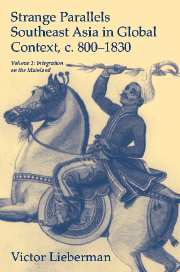Book contents
- Frontmatter
- Contents
- List of Figures
- Principal Political Eras on the Mainland
- Abbreviations Used in the Notes
- Preface
- 1 Introduction: The Ends of the Earth
- 2 One Basin, Two Poles: The Western Mainland and the Formation of Burma
- 3 A Stable, Maritime Consolidation: The Central Mainland
- 4 “The Least Coherent Territory in the World”: Vietnam and the Eastern Mainland
- Conclusion and Prologue
- Index
Preface
Published online by Cambridge University Press: 06 January 2010
- Frontmatter
- Contents
- List of Figures
- Principal Political Eras on the Mainland
- Abbreviations Used in the Notes
- Preface
- 1 Introduction: The Ends of the Earth
- 2 One Basin, Two Poles: The Western Mainland and the Formation of Burma
- 3 A Stable, Maritime Consolidation: The Central Mainland
- 4 “The Least Coherent Territory in the World”: Vietnam and the Eastern Mainland
- Conclusion and Prologue
- Index
Summary
My strongest academic memory from graduate school – a feeling, I am certain, not unique to me – was a sense that precolonial Southeast Asian historiography was desperately chaotic and difficult to penetrate. Texts available in the 1970s and 1980s offered an endless array of names, battles, and dates with few, if any, long-term patterns discernible for individual realms, much less the region as a whole or major subregions.
I also remember thinking – a more idiosyncratic reverie, no doubt – how very curious it was that the 16th-century unification of Burma coincided with the dramatic annexations of Ivan IV in Russia, and that in both Russia and Burma these conquests yielded to periods of utter chaos at the turn of the 17th century. Preoccupied with Burmese research, I relegated such coincidences to the “useless trivia” section of my mind. But years later, when completion of some Burma projects allowed me to revisit the issue of correlations, it gradually dawned on me that far from being a 16th-century peculiarity, parallel chronologies extended throughout much of Burmese and Russian history. What is more, I began to realize, substantially similar chronologies were shared by other far-flung sectors of Eurasia with no obvious connection to either Burma or Russia.
The present two-volume study Strange Parallels: Southeast Asia in Global Context, c. 800–1830 addresses these abiding, ultimately interrelated, concerns: What were the principal long-term trends in precolonial Southeast Asian political, cultural, and economic history?
- Type
- Chapter
- Information
- Strange ParallelsSoutheast Asia in Global Context, c.800–1830, pp. xix - xxivPublisher: Cambridge University PressPrint publication year: 2003

